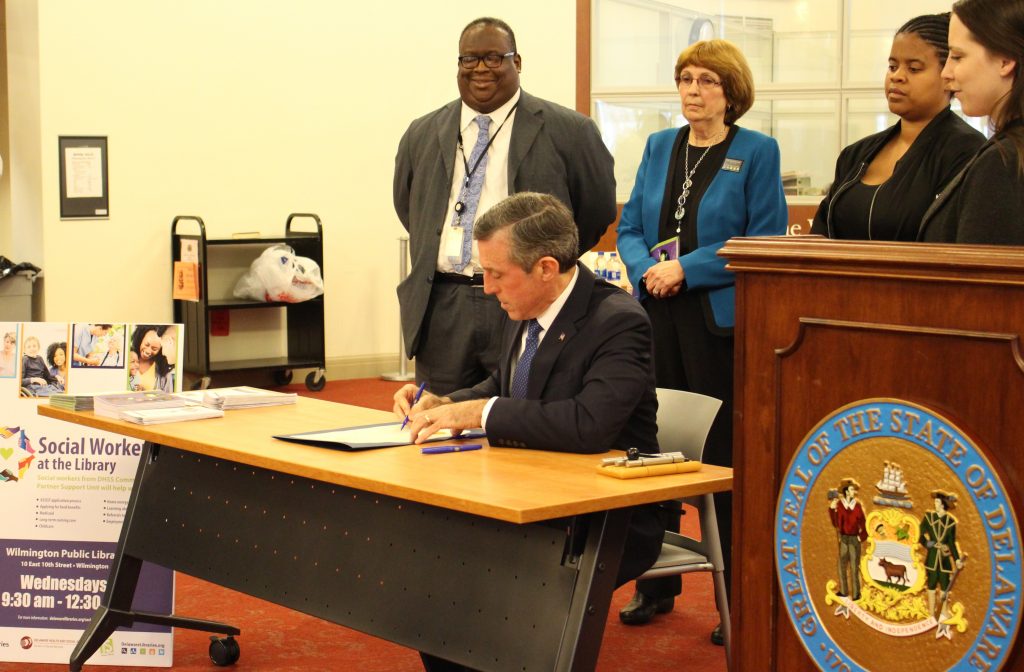Governor signs proclamation marking March as Social Work Month
WILMINGTON, Del. – Governor John Carney on Thursday recognized the role of Delaware’s social workers as he signed a proclamation marking Social Work Month. The Governor signed the proclamation during an event at the Wilmington Public Library, one of seven libraries statewide where since January social workers have been stationed once a week to answer questions and connect patrons to social services.
“Social workers are a vital source of support for many individuals, families and communities here in Wilmington and throughout our state,” said Governor Carney. “The Social Worker at the Library program is just one way these compassionate, dedicated individuals help others cope and thrive in the face of life’s challenges, and help us build a stronger and healthier Delaware.”

At the libraries, social workers guide patrons through the state’s online benefits application process, steer them to resources that provide basic needs like food, shelter, clothing, health care, child care, and education; connect them with services to treat addiction or address domestic violence; and help them get training and opportunities to find and keep jobs with decent wages. This onsite assistance is provided in addition to the help available at the 15 state service centers.
The social workers who staff the libraries come from the Department of Health and Social Services’ (DHSS) Community Partner Support Unit, operated within the Division of Social Services.
“Our social workers are meeting the community where they are,” said Dr. Kara Odom Walker, Secretary of DHSS and board-certified family physician. “As a doctor, I know some of the things my patients need such as housing, employment or transportation can’t be provided through a prescription. In the libraries, our social workers are finding another way to connect individuals to those support services.”
Libraries were identified as a natural fit for this outreach since many people who need assistance are already library patrons.
“Delaware libraries have become ‘force-multipliers’ for community outreach and engagement across the state,” said Dr. Courtney Stewart, Deputy Secretary of State. “This is another outstanding example of the added value our libraries can provide by partnering with agencies and organizations across the social services spectrum.”
“The Division of Libraries is delighted to have the expertise of social workers in libraries to assist patrons in need,” said Dr. Annie Norman, Delaware’s State Librarian. “Now more than 150 agencies and nonprofits are partnering with libraries to extend their reach and effectiveness in providing services to Delawareans across the state.”
Social workers have helped about 150 people since the program’s launch.
“I was homeless for a couple of months, staying in abandoned buildings, on the streets, even benches. I basically broke down and told [social worker Chloe Mayo] my situation,” said Sharis Purnell, a 27-year-old Wilmington woman who recently found help through the Social Worker at the Library program. “She literally called everyone, all the shelters [and other emergency housing resources]. Everything is going to be OK. I’m staying positive. Just when I thought no one cared, I opened my mouth and got the help I needed.”
With additional help from the library staff and from the nonprofit Housing Alliance Delaware, Purnell was offered a temporary bed at the Salvation Army in Wilmington and has been accepted into that organization’s rapid rehousing program, which provides temporary housing subsidies to families and single women. She is also getting help applying for jobs.
 “Sharis is 27; my son is 27. If my son ever had a problem, I would want someone to treat him the way I treat Sharis. They’re all our children,” said Chloe Mayo, a social worker in the Division of Social Services. “She’s not going to be able to get rid of me until she’s able to show me she’s on a path to success in life. I see her doing great things.”
“Sharis is 27; my son is 27. If my son ever had a problem, I would want someone to treat him the way I treat Sharis. They’re all our children,” said Chloe Mayo, a social worker in the Division of Social Services. “She’s not going to be able to get rid of me until she’s able to show me she’s on a path to success in life. I see her doing great things.”
Library patrons in Kent and Sussex counties are also benefiting from the social workers’ presence.
Social worker Mel Mahoney recently helped a man complete an online job application in the Dover Library when the applicant did not have a computer or know how to operate one. The man later informed Mahoney that he had been hired for the position.
At the Frankford Library in Sussex County, social worker Dorian Baker has been working with a man in his 60s who needed help applying for medical assistance following a recent stroke, and has returned to the library frequently with questions for Baker about his benefits.
The Division of Social Services has received positive responses to the library pilot program and is placing social workers from the Community Partner Support Unit at other pivotal sites, especially in and around Wilmington.
“We are present at the Hicks Anderson Community Center, Latin American Community Center, and the Department of Correction’s Cherry Lane Probation and Parole Office in New Castle,” said Ray Fitzgerald, Director of the Department of Health and Social Services’ Division of Social Services. “And we’re walking the beat with Wilmington’s community-police unit as part of the city’s West Center City neighborhood stabilization effort. It’s all about increasing access to services by going where our clients are.”
Here’s the statewide schedule for the Social Worker at the Library program:
• North Wilmington Public Library, 34th and Market streets, 11:30 a.m. to 2:30 p.m. Fridays
• Wilmington Public Library, 10 E. 10th St., Rodney Square, 9:30 a.m. to 12:30 p.m. Wednesdays
• Route 9 Library, 3022 New Castle Ave., New Castle, 1 to 4:30 p.m. Tuesdays
• Dover Public Library, 35 Loockerman Plaza, 9 a.m. to noon Wednesdays
• Seaford Public Library, 600 N. Market St. Extension, 1:30 to 4:30 p.m. Mondays
• Selbyville Public Library, 11 S. Main St., 10 a.m. to 12:45 p.m. Thursdays
• Frankford Public Library, 8 Main St., 1:30 to 3:30 p.m. Thursdays
###
Related:
Social Workers at the Libraries
Governor Carney’s 2018 State of the State
Pilot Program Will Connect Library Patrons to State Services


